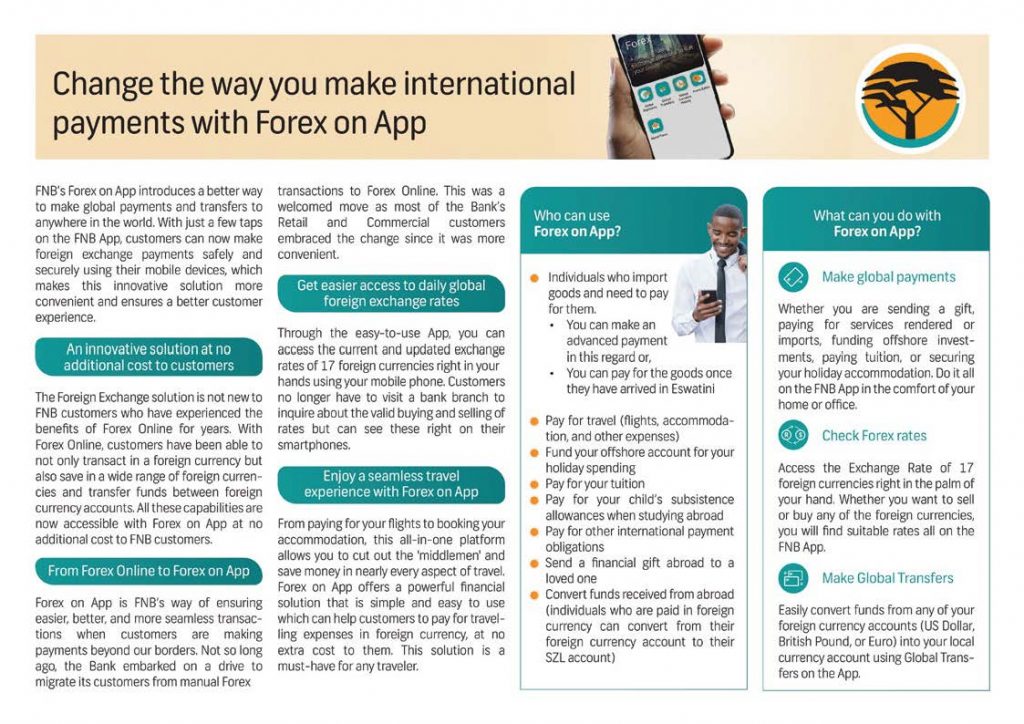When the Minister of Finance, Neal Rijkenberg, delivered his Budget Speech for 2022/23, he reassured Parliament and the nation that the financial sector remained resilient to the economic disruptions associated with the COVID-19 pandemic. This was despite the pandemic continuing to present a challenging operating-environment for the banking sector, he said – wherein credit and operational risks to financial stability remain elevated – and was largely made possible by monetary and macroprudential policy measures. Minister Rijkenberg detailed how the pandemic’s adverse effects on domestic economic activity had affected the financial condition of households and businesses, with a knock-on effect on credit, liquidity and operational risks in the banking system.
Continuing, he explained that the Central Bank of Eswatini (CBE) had decisively intervened with monetary and macroprudential policy measures aimed at safeguarding financial system stability, as well as supporting economic recovery. Measures were implemented to alleviate the impact of the pandemic on Supervised Financial Institutions, such as giving permission to these institutions to grant credit relief to borrowers affected by the pandemic, reducing the minimum liquidity requirements by five percent for all banks that may come under liquidity distress, enabling the deferral of the payment of dividends, and promoting the utilisation of digital and cashless payment platforms. Consequently, the measures supported the banking sector in building up and maintaining ample capital and liquidity buffers, over and above the statutory minimum requirements, to cushion them against emerging risks during the pandemic period. The Minister asserted that “this provides for confidence and certainty in our economy, as the CBE stands ready to take action in order to address any emerging risks to financial sector stability.
Rijkenberg then disclosed that, as part of government’s mandate of ensuring a sound financial regulatory framework for the country, several banking and non-banking laws will be reviewed in order to create an environment which promotes private sector development. Furthermore, recent initiatives within the financial sector included completion of the automation of the Eswatini Stock Exchange, which will facilitate the participation of ordinary Emaswati to buy and sell companies’ shares and debt instruments using their cellphones. The Minister opined that the latter would facilitate electronic trading, which in turn should encourage more listings as well as active trading exchange. Furthermore, as the Eswatini Stock Exchange also incorporates a SME platform that enables small and medium enterprises to participate in the stock exchange, government expects that Swati-owned businesses will benefit from accessing available financial resources in order to expand their undertakings.
Financial Inclusion statistics, as announced by Minister Rijkenberg:
• 85 percent of Emaswati have access to formal
financial services, with inclusion at
– 90 percent among adults residing in urban
areas, compared to
– 83 percent in rural areas
– 87 percent among women, compared to
– 83 percent among men
The Minister stated that government will develop and finalise a Financial Inclusion Policy as well as legislation to improve access to development finance. The National Financial Education Strategy will also be concluded, this to provide a framework and roadmap wherewith to educate the populace financially.
Financial Stability
Continuing, Rijkenberg spoke of how the CBE assesses the financial sector in order to ensure that it is stable, and how it noted that “pockets of vulnerabilities” nevertheless exist. These risks largely emanate from the low interest-rate environment prevailing both domestically and internationally, he said, as it presents a double-edged sword: on one hand, low interest rates have the potential to boost economic productivity by encouraging loans and the use of credit facilities, but on the other hand could incentivise risk-taking among investors in search of higher yields. The Minister said that the CBE continued to monitor the banking sector in light of a volatile global environment and instituted mitigation actions, as a result of which the banking system’s resilience improved. He reported that said improvement was largely due to enhanced capital quality and increased coverage of risk for capital market activities introduced by the migration to Basel II and IFRS9 rules.
Rijkenberg disclosed that Savings and Credit Cooperative Societies’ total combined assets grew to E1.7-billion from E0.85-billion when the financial regulation came into effect, reflecting an 85 percent increase in the assets of the sector. He said that overall, risks from the non-bank financial sector remained elevated despite notable growth in the sector’s assets, and that the risks originated from the volatility of financial markets. Concentration-risks also remained high in the Pension and Retirement Funds subsector, and as a result of which, government together with the CBE drafted a Financial Stability Bill that aims to be an overarching guide to macroprudential surveillance.
The Minister explained that while the ultimate goals of macroprudential surveillance are risk mitigation, planning for potential crises and how to manage risk, the Bill is also a significant pillar of guarding financial stability: in this regard, the CBE’s work of formulating a crisis-binder is ongoing, and the institution is furthermore exploring options of establishing a Deposit Protection Scheme. The latter is reportedly an integral part of the Crisis Preparedness, Management and Resolution Framework that is currently under development. The framework will bring Eswatini in line with international best practices on macroprudential surveillance in light of dynamic global risk parameters, from which the kingdom is not exempt.
Developments in Financial Sector Regulation
The Finance Minister informed Parliament and the nation that implementation of the Basel II regulatory enhancement project was under way, the aim of which is to ensure that consumers are protected while Banks remain resilient to shocks. He said it was anticipated that all of the Pillars’ by-laws would soon be finalised: furthermore, the CBE was continuing to review secondary legislation for laws under its purview, this in trying to be responsive to changes that prevail in the banking landscape.
Financial Integrity
Minister Rijkenberg detailed three initiatives which have become synonymous with the worldwide fight against cybercrime:
* The Eswatini Financial Intelligence Unit has continued to play an important role in the Anti Money Laundering (AML) and Counter Financing of Terrorism (CFT) efforts, both from a policy and technical perspective through its distribution of information to law-enforcement agencies
* To ensure the integrity of the financial system, the CBE has reviewed and deployed its AML and CFT risk-based supervisory framework: the aim is to ensure that the financial system is not used to launder illicit funds or finance terrorism and, if it so happens, such practice is quickly monitored and perpetrators are detected and deterred from such conduct
• In addition, government passed legislation which provides a mechanism for civil forfeiture of the proceeds of crime: this is a process that runs parallel to the criminal prosecution and seeks to separate offenders from their ill-gotten gains
FX
Rijkenberg concluded his remarks with observations regarding Eswatini’s forex scenario:
• To ensure prudent administration of exchange controls, the CBE phased in a risk-based
approach which resulted in the adoption of a financial surveillance function
• Stakeholder engagements with authorised dealers increased, this in order to ensure ease of implementing the surveillance function: the CBE will be revising the simple guide to exchange controls to further enhance the public’s understanding of the foreign exchange system.
First National Bank (FNB) of Eswatini began operating in Eswatini in 1995, and since then has grown to be a market leader in terms of portfolio size, profits, and penetration across the Retail, Commercial and Corporate sectors. The FNBE footprint is widely spread with a network of 11 branches, 2 agencies, 80 ATMs, 26 ADTs, and 320 CashPlush Agents nationwide. The Bank currently employs more than 400 staff.
The Bank’s products and services cover the requirements of all customers, from large corporate entities to small and medium commercial businesses, and individual customers. A strong, customer-focused culture ensures that products are tailored to clients’ needs and are accessible to all. The offering ranges from transactional to save and invest products, as well as a comprehensive lend portfolio covering not only personal needs but also focusing on property loans and asset finance. FNBE’s insurance portfolio is also seeing significant growth.
Mobile and digital banking solutions aimed at making transactions convenient and cost-effective for clients have yielded positive results. The bank’s technology solutions in the form of Online Banking and mobile apps like the FNB Banking App and Cellphone Banking are so deeply entrenched, that they are now the primary channels that FNB customers are conducting their transactions, with fewer and fewer customers using the branch to access banking.
A true commitment to being the Bank that can help “start, run and grow your business”, FNB’s Online Banking and FNB App for Business help business owners save time by having access to their daily account balances, transaction history, statements, and create/add or remove beneficiaries as required and be able to make payments and transfers 24/7. eWallet Bulk send is another popular product with businesses, as it enables business owners to send an eWallet to multiple recipients simultaneously. This banking solution ensures financial inclusion and accessibility to banking features for the FNB-banked, the non-FNB-banked, and the un-banked Swazi national.
Cash Plus is a convenient way for both FNB and non-FNB customers to deposit and withdraw cash as well as be able to purchase prepaid electricity and airtime from retailers who are registered FNB CashPlus Agents. As of April 2022, 394 CashPlus Agents have been made available to customers countrywide and this number continues to grow rapidly. This solution is aimed at bringing banking closer to the homes of FNB customers.
FNB goes outside the boundaries of banking to help customers transact globally with ease. The Treasury and Forex departments cater to all local and foreign market transactions, offering expert international banking advice and information. Retail customers can now make cross-border payments, global payments, and transfers to anywhere in the world with Forex on the FNB App. With just a few taps on the FNB App customers can now make foreign exchange payments safely and securely using their mobile devices, which not only makes this innovative solution more convenient, but it also makes for a better customer experience
WesBank, with dealership representation in Manzini and Mbabane, is FNB’s leasing arm specializing in competitive leasing services for vehicles, motorbikes, machinery, and equipment. It is a key provider of asset-based finance catering for both corporate and individual clients and provides customer service facilities at several motor dealer outlets countrywide.
The FNB Eswatini Foundation was launched in 2014 with the aim of creating an FNBE footprint through corporate social investment actions in local communities where the Bank operates. Through the Foundation’s core pillars focused on the development of health, entrepreneurship, social welfare, and education initiatives in the country, FNB continues to showcase its commitment to a transformative agenda that ultimately seeks to improve the lives of the people of Eswatini.
For more information contact us through the following channels:
• Contact Support Centre: 2518 6000 or 800 6100
(Toll-Free)
• WhatsApp: 7802 9591
• Email: gethelp@fnb.co.sz
Standard Bank Eswatini declares in its Vision statement that ‘Eswatini is Our Home, We Drive Her Growth’. The institution recognises that efforts to drive the nation’s growth cannot be in isolation of the Small and Medium Enterprises (SME) sector, because SMEs are the backbone of the Swazi economy and remain vital in the creation of new jobs.
Standard Bank is strongly supportive of the SMEs and aspires to remain relevant in this market: during the past five years the Bank has invested over E300-million in developing its digital capabilities for this sector, whilst also enhancing the financial and investment solutions that it has been offering all along. The Bank’s hunger is to continually find ways to enable SMEs to succeed and grow by partnering to simplify routine banking, as well as in providing relevant financing models for local SMEs. Its Enterprise Banking Value Proposition – delivering affordable, accessible and reliable financial and digital solutions to the SME sector – is based on the following pillars:
1. Relationship Management: Standard Bank offers personalised banking to SMEs through Relationship Managers, which is a proactive approach to serve and help business owners grow their enterprises from small to large.
2. Accessibility: Understanding that time spent away from one’s business can equal money lost, the Bank’s self-service digital channels enable transacting at any time of day or night.
3. Simplicity: The entire Enterprise Banking product range is uncomplicated and tailored to the needs of this sector.
4. Access to Financial and Business Expertise: This pillar personifies Standard Bank’s pay off line, ‘Moving Forward’. The institution offers a profound reservoir of financial and business expertise through its Business Bankers and through leveraging its relationships with banks within the Standard Bank Group, as well as across business partnerships.
Standard Bank’s value proposition has two main elements, a Digital Services Offering and a Product Offering:
1. Enterprise Direct is a business centre dedicated to making banking easy, simple and accessible for all SME clients. Simply by calling (+268) 2517 5310 or dialling a shortcode at an eBanking cubicle in any Standard Bank branch, a client is able to get immediate assistance.
2. Enterprise Online is an internet-based banking platform that allows clients to make payments, transfers, open accounts and buy value added services in real-time, anytime, anywhere.
3. Cash Deposit Machines
• Allow clients to make bulk deposits
• No ATM Card needed
• Banking Hours do not apply
• Make deposits to any account
• Real-time reflection of deposits
Eswatini Development & Savings Bank (EDSB) – known as ‘Eswatini Bank’ – is wholly owned by government and is also the only 100-percent locally-owned bank in the country. As defined by its name, EDSB is both a development and a commercial entity: its development function includes financing projects or businesses in sectors such as industry, commerce, agriculture, transport, mining, SMMEs, healthcare, tourism, youth entrepreneurship, property development, etc.
Eswatini Development Finance Corporation (FINCORP)
Fincorp has provided access to financial assistance to thousands of Small and Medium Enterprises (SMEs) and individuals across all economic sectors, thereby making a meaningful contribution to improving the standard of living and general economic growth. Entrepreneurs operating both on Eswatini Nation Land and Title Deed Land continue to receive financial assistance to start new businesses and/or expand existing ones. A significant proportion of FINCORP’s loan book represents agribusiness activities, mostly situated in rural areas. Statistics have shown that the agricultural sector offers enormous job opportunities to the general population throughout the country is also key to economic recovery. Other major sectors include trucking and haulage, forestry, property investment, and general business, covering trade, retail, manufacturing, construction, and services.
Highlights for the past 27 years
- FINCORP has disbursed a cumulative E6.3 billion in loans.
- Has assisted over 80 000 SMEs and individuals from inception to date.
- Created over 15 000 jobs.
- Companies financed by FINCORP contribute about E1.5 billion to the Gross Domestic Product (GDP).
- FINCORP has made good strides in strengthening its footprint by setting up a remote branch network in order to be more accessible.
- The company has also established a Business Development Support (BDS) unit to provide advisory services to clients through mentoring and coaching and to provide needs-based business training to clients.
- Delivered meaningful development impact in various rural communities.
- FINCORP later diversified its product offering by setting up two subsidiary companies, namely;
- FIRST FINANCE COMPANY which offers General Purpose Finance.
• FINSURE ASSURANCE LIMITED which offers Insurance Products.
FIRST FINANCE has grown to become one of the leading micro-lenders in the country, while FINSURE has presented an opportunity to broaden product offerings in the financial services sector and offer additional convenience to clients in so far as long-term insurance is concerned.
FINCORP’s state-of-the-art Head Office at the corner of Gwamile and Dabede Streets in Mbabane also houses the FINCORP Mbabane Branch; the FIRST FINANCE Head Office and Branch. The building also houses FINSURE ASSURANCE LIMITED.
FINCORP’s outlook is quite optimistic. The new five-year strategy for 2022 – 2027 is anchored on “Digital Transformation and Improved Customer Experience.” This strategy aims to deliver the company’s most ambitious goal of fully embracing digital platforms, innovation, and agility in order to continue ‘Helping You To Help Yourself.’
FINCORP SUBSIDIARIES
1. FIRST FINANCE COMPANY (Pty) Ltd is a financial services provider currently operating in Eswatini. It provides a wide range of general-purpose financial services across the kingdom. Since 2010, FIRST FINANCE has invested in expanding its footprint and professional teams throughout the country to meet the dynamic needs of its clients. Key clients include salaried employees of government, parastatals and selected private companies.
The company has consistently experienced phenomenal demand for loans since its inception. Despite challenges attributed to the COVID-19 pandemic, during the 2021 financial year, FIRST FINANCE has disbursed over E1 billion into the pockets of emaSwati! This astronomical amount represents loans held by employees from both the private and public sectors. FIRST FINANCE offers;
a) Short Term Loans: These are loans that can be paid within the shortest period between 1-24 months.
b) Medium Term Loans: These are loans that can be repaid within the median period. An individual can also revolve the loan when a need arises. The repayment period ranges from 25-48 months.
c) Long Term Loans: A long-term loan is generally considered to be a loan with a repayment term longer than five years. These loans are repaid wFIRST FINANCE loans are mostly repaid through source deduction for clients whereby the employer has formalized a Memorandum of Agreement (MOA) with the company. Meanwhile, source deductions for civil servants are administered through the Central Deduction Administration System (CDAS).
2. FINSURE ASSURANCE COMPANY is an insurance company wholly owned by FINCORP. It offers Long-Term Insurances services with a significant proportion being credit life insurance. FINSURE ASSURANCE works with both corporate and individual clients. Having been in the industry for a long, the company prides itself on living up to its customer’s expectations and delivering on its promise of service. FINSURE ASSURANCE products include;
a) Life Insurance: Group life insurance and pensions, life ordinary or individual life, and funeral schemes.
b) Credit Life Insurance: insurance of the debts held by clients in the event of death.
In conclusion, the corporation remains fully committed to its founding mandate of (I) Providing access to credit; (II) Job creation, and finally (III) Poverty alleviation in order to make a meaningful contribution to the socio-economic development of the nation.
Nedbank Eswatini is an international bank that is a subsidiary of the Nedbank Group of South Africa: as such, it creates value through constant innovation and reinvestment. With brand repositioned, Nedbank seeks to be more client-centric, driven by a fresh, engaging tagline: ‘See Money Differently’. Nedbank saw an opportunity to revitalise the brand to reflect some of the business changes that have been taking place. Based on the insight that money well managed can make a positive difference to individuals, businesses and communities, Nedbank chose to challenge and inspire the public to ‘See Money Differently’. This inspiration is consistent with Nedbank’s purpose of using its financial expertise to do good.
Headquartered in the NedCentre Building, Swazi Plaza, Mbabane, Nedbank has 11 branches, an agency and a Bureau de Change, as well as 52 ATMs nationwide. Through Wholesale, Business, Retail and SME banking, the Bank offers a wide range of products coupled with exceptional services such as lending, global business products, investments, loans, e-banking, asset-based finance, bancassurance, digital banking services, treasury and transactional banking. With the upgraded core banking system, the Bank introduced in its offerings real-time banking as well as Mobile Banking with the Nedbank Money (Africa) app that allows clients to transact at the palm of their hands, anytime, anywhere. Nedbank Online Banking allows customers to enjoy access at their convenience and, most importantly, on a secure platform at the comfort of their homes or offices.
Nedbank uses its financial expertise to do good for individuals, families, businesses and society through innovative products and a superior banking service that is accessible and convenient. The Bank does more than just make day-to-day banking easy through its cheque, savings, investment, Mobi-Money and credit accounts, it views banking differently by providing vehicle finance and home loans, Credit cards, foreign exchange for travellers, and life assurance and insurance to cover individuals, their loved ones and assets. In terms of growth in the value of savings with Nedbank Eswatini and in asset-based finance and home loans, the institution continues to enhance its administrative efficiency. Furthermore, high-net-worth individuals are increasingly turning to Nedbank Private Banking for superior service in protecting and growing assets.
Nedbank’s Current Account is a convenient, safe and cashless mechanism for the payment of goods and services: client-benefits include ATM card, cheque book, interest earned, debit orders, electronic funds transfer and overdraft facilities which can also be accessed by third-party payment. Customers stand to qualify for a Personal Loan facility and an Overdraft which is a quick and convenient way of accessing funds when in need. Loan products also include Home Loans (Urban and Rural), Lusiba Education Assistance Programme (LEAP) loan, and Vehicle and Asset Finance: these ensure access to funds at critical times.
For entry-level-income customers and pensioners, Nedbank offers the Savings Plus account which is a standard account that features card-based transactions and the options of SMS notification, online and Mobile banking. The Just Save accounts offer attractive methods of saving funds without incurring fees or commission, and bring the advantages of free banking as well as highly competitive rates. Fixed and Notice deposits are alternatives that offer varied periods and are accessible. The Club Savings Account that targets groups and clubs with a minimum of three people, does not attract maintenance, service and deposit charges. Customers in this group savings account get two free withdrawals per month.
• SME and Institutional Banking: Economic research has shown that developing countries can increase economic activity by empowering their SMEs. Nedbank Eswatini’s SME Banking came about following the Bank’s decision to tailor-make products and services specifically to assist and address SME business and banking needs.
• Private Banking: Nedbank caters specifically for the personal financial needs of high-net worth individuals. It offers a specialised level of service and a personal contact point for all customer financial requirements, be they general banking, portfolio management, estate planning or insurance and lending needs.
• Wholesale and Business Banking: More than just a product provider – we are a strategic financial partner with a focused objective to help our clients achieve their business vision and expand their opportunities. This is achieved through the provision of tailored solutions, characterised by innovation and a highly integrated partnership approach.
• Asset-based Finance: Nedbank ensures that clients enjoy the process of purchasing a vehicle, for personal and/or business use and gets them behind the wheel in no time.
• Global Business: This department facilitates clients’ finance and/or transaction settlements, minimising credit and operational risks and maximising our client’s ability to trade.
• Treasury: This department facilitates foreign currency trading and wholesale deposit-placements and offers specialised solutions in foreign exchange and interest rate risk management.
Eswatini Building Society (SBS)
Eswatini Building Society declares that in the face of slow economic progress, it has maintained steady growth for the past 59 years, thereby ‘Creating Wealth for You’: it is the major provider of long-term mortgage lending and loan finance for the purchase of vacant land, completed property and constructing affordable housing. The Society has vast knowledge of the local mortgage bond market and meets client demand, including below-prime mortgage loans for residential property, repayment holidays and bond re-advances and rescheduling. SBS also offers commercial mortgage loans to the business community to obtain and develop commercial property: this is linked to the Bond Re-Advance facility that enables businesses to secure loans within 24 hours to finance working-capital requirements against bonded property.
SAFEGUARDS & SAVINGS
Eswatini Royal Insurance Corporation (ESRIC) – est. 1973 – is a solid and reputable insurer, contributing to a stable domestic insurance environment that benefits the Eswatini economy. Its main business activity is the provision of short-term insurance, life assurance to individuals, and pension administration.
Lidwala Insurance Company is a locally owned, short-term insurance company which opened its doors in 2009 after acquiring an operating licence from the Registrar of Insurance and Pension Funds.
Liberty Life Eswatini is a specialist life insurance company that provides group and individual/personal risk insurance solutions for life-changing events.
STANLIB Eswatini is a subsidiary of the Liberty Life. STANLIB Eswatini prides itself on being the largest asset manager based in the kingdom.
Old Mutual Eswatini is committed to playing a meaningful role in the country’s economic development and helping clients build wealth and attain financial independence by investing and growing their savings.
The Eswatini National Provident Fund is a savings scheme that provides benefits to employed persons when they retire or become incapacitated.
The Public Service Pensions Fund (PSPF) was established to manage and administer pensions for government employees. It is also charged with managing and investing the accumulated pension assets of the scheme. The PSPF provides Retirement Annuities, Death Benefits, Disability Benefits and other pension-related benefits.







